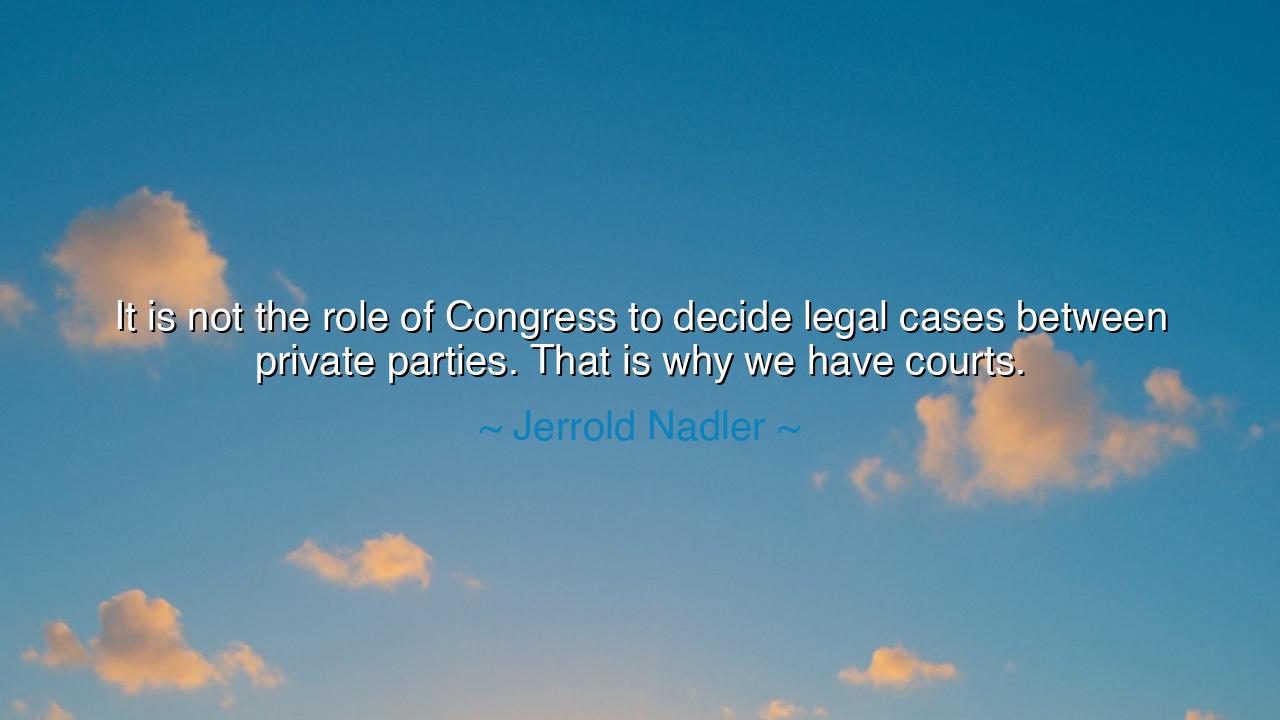
It is not the role of Congress to decide legal cases between
It is not the role of Congress to decide legal cases between private parties. That is why we have courts.






Hearken, O seekers of wisdom, to the words of Jerrold Nadler, who proclaimed with clarity and authority: "It is not the role of Congress to decide legal cases between private parties. That is why we have courts." In these words lies a meditation on the separation of powers, the sanctity of law, and the wisdom of institutions designed to preserve justice. Nadler’s insight reminds us that governance is not merely a matter of authority, but of structure, principle, and the careful allocation of responsibility.
Since the dawn of organized societies, humans have recognized the perils of conflating the duties of rulers. In the courts of Athens, magistrates adjudicated disputes, while the assembly legislated policy. In Rome, senators debated laws but did not serve as judges in private disputes. Nadler’s words echo this ancient wisdom: that Congress, tasked with crafting law, must not encroach upon the adjudicative functions reserved for courts, lest justice be clouded by politics and the impartiality of law be eroded.
Consider the tale of King Solomon, whose wisdom in resolving disputes became legend. While he commanded the realm, he did not legislate or arbitrarily adjudicate every private quarrel; instead, he applied discernment within the framework of law. Nadler’s reflection mirrors this principle: the courts exist to ensure that disputes between private parties are resolved with impartiality, guided by precedent, evidence, and reason, rather than by the shifting tides of legislative authority.
In more recent history, the United States has faced instances where the boundary between Congress and the courts was tested. From disputes over property to conflicts involving contracts, the framers of the Constitution established a deliberate separation of powers to prevent abuse and maintain fairness. Nadler’s statement reminds us that this design is no mere formality: it preserves the integrity of both law and governance, ensuring that no branch of government can usurp the impartial judgment owed to every citizen.
The essence of this reflection is both practical and moral. When Congress attempts to decide legal cases between private parties, it risks injecting bias, favoritism, and political calculation into matters that demand neutrality. The courts serve as the guardian of justice, insulated from expediency and ideology, allowing citizens to resolve disputes with certainty that the outcome will be guided by law rather than by the will of the majority. Nadler’s words teach that structure is as vital as principle in maintaining order and fairness.
From this reflection emerges a timeless lesson: justice thrives when roles are respected and boundaries honored. Power is not merely wielded; it is channeled through institutions, each designed to fulfill a specific purpose. Nadler’s observation underscores that the rule of law is sustained not by ambition or intervention, but by the discipline to confine action within proper spheres—Congress legislates, courts adjudicate, and citizens are assured the impartiality of both.
O seekers of wisdom, let this teaching guide your actions. Recognize that disputes, whether personal or public, must be resolved in the proper forum. Advocate for the independence of institutions, honor the separation of duties, and trust in the processes established to safeguard fairness. Nadler’s words remind us that the architecture of law and governance exists to protect the weak, guide the powerful, and preserve the moral order of society.
Take this teaching into daily life: respect the boundaries of authority, seek resolution in the proper forum, and uphold the principles of impartiality and due process. By doing so, you honor the wisdom of centuries, strengthen the integrity of law, and participate in a society where private parties may find justice not through power or favor, but through the fair and measured judgment of courts, as was intended from the dawn of civilized governance.






AAdministratorAdministrator
Welcome, honored guests. Please leave a comment, we will respond soon